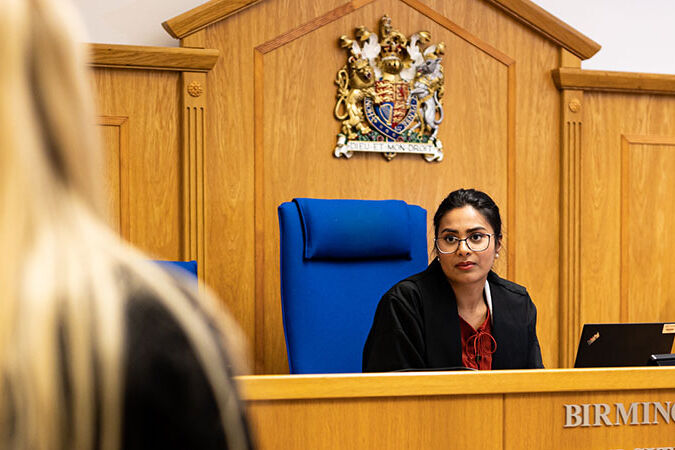
Blog

When starting out on the journey towards university, most students start looking at either the big picture, or the finer details.
Some are more concerned with specific universities. This may be because of reputation, location or family history. Others are more interested in nailing down exactly what course they want to study, and will then start searching through the UCAS website to find the right one for them. They are less concerned about which university the ideal course happens to be at.
In this article, we’re going to look at the middle ground which both types of searcher have to look into at some point – picking the right academic school or department for you.
Every university is split into schools, faculties or both, with each overseeing courses that fit under the same broad umbrella of subjects. These may then be split further into more specialised departments. For example, at Birmingham City University, our Law School sits within the same faculty as the Business and Social Sciences Schools.
These schools, and the services they offer, may be more important to your university experience than you had initially considered, so below we’re going to detail the key features you should keep an eye out for when choosing the right law school for you, whether that be at Birmingham City University or beyond.
Accreditations
This may be the most important thing of all to look into when researching potential law schools. In the case of law degrees, the governing and professional bodies can recognise both academic schools and individual courses, so their accreditations are a clear indication of whether or not a a degree at any given law school is up to professional standards.
If a course has accreditation, it should be clearly identifiable on the website or prospectus. This may not always be the case, since some new courses won’t gain accreditation straight away. However, if you don’t find them on the course page, it’s worthwhile dropping the university a line to find out.
For law courses, the most important accreditation to look out for currently is one from the Joint Academic Stage Board of England and Wales. This accreditation confirms that the undergraduate law degree in question is regarded as a Qualifying Law Degree, enabling students to progress to qualification as a barrister or solicitor. It is also worth looking for accreditations from the Law Society and Bar Council.
Facilities
You have probably scoped out the accommodation and campus of each of the universities you’re considering, but it’s also worth looking into what facilities are available to you that are specific to a law school. It may not be the first thing that comes to mind when thinking about law courses, as they aren’t as dependent on specialist equipment as creative or engineering courses, but some universities have invested in professional-standard environments.
Quality law schools should have mock court rooms on campus. These courts have been designed to replicate as closely as possible the set up seen in real courts of law, so that students can get used to the procedures, rules and regulations, embedded in the legal environment, that they will encounter later on in their career. They are also an excellent place to sharpen the academic skills you’ll learn during the course, either through taught sessions in the court or through extra-curricular clubs like mooting and debating societies.
Location
Alongside facilities offered on-campus, it is also worth keeping in mind a law school’s geographic location, for more than one reason. Firstly, it’s useful to look for any information the school offers about their connections to local law firms. Law schools will naturally want to have good relations with the legal community on their door step – it can mean placement and job opportunities for students, and allow for legal experts from the local area to come to the university to give talks.
But, thinking further ahead, a university located in an area with a lot of law firms means you as a student have a better chance of both gaining experience during your course, and landing a job following graduation, especially if you intend to stay in the same area once your course is finished. Do some research into local law firms related to the course you’d like to study, and it may become apparent that some locations have larger numbers in certain legal areas than others, which could sway your decision.
Placements
Speaking of placements, it’s worth considering if taking a sandwich or professional placement year during your course, to get professional experience, is right for you. If you feel you could benefit from one, it’s definitely worth looking for law schools that offer them or, alternatively, other work experience opportunities. Our School of Law, for example, runs an American internship programme in addition to professional placements.
Graduating with not only your academic skills but also work experience can put you ahead of a lot of other graduates when looking for a job. Furthermore, make sure you look into other employability services offered by your law school – do they have a dedicated careers team who can help you gain those non-academic skills, such as interview prep and CV writing?
Staff
Another aspect of university life you may not have thought to look into is the teaching staff. On a course page, you may get a small sampling of the key lecturers on a course, but that doesn’t tell you the whole story. But it is worth looking into, as it can really show the overall strength of a department.
Law schools want not only the best teachers, but also individuals with major experience in the field. The greater the number of teaching staff that have actual legal experience to call on, the higher the probability of the course being more up-to-date and relevant to current professional practice. And from a student point of view, who better to learn from than someone who has held major positions in the profession - roles you yourself may one day want to hold?
Another related area to look into is the research areas the law school operates in. These research clusters are predominantly made up of staff and postgraduate students, so may not be immediately relevant to undergraduate students, but they can point towards the subject areas the school specialises in. If they have a large and prominent human rights research cluster, for instance, that usually means they have a strong teaching base in that area.



